Jay Schulz one of three lead plaintiffs in concussion class action lodged against the AFL
Another former AFL star has joined the concussion class action lodged against the AFL and multiple clubs as a lead plaintiff, saying he suffered up to 40 concussions throughout his career.
AFL
Don't miss out on the headlines from AFL. Followed categories will be added to My News.
Former Richmond and Port Adelaide high-flyer Jay Schulz has been named as one of three lead plaintiffs in a concussion class action lodged against the AFL and multiple clubs on Friday.
A statement of claim submitted to the Victorian Supreme Court by top South Australian lawyer Greg Griffin also identifies former Hawthorn and Adelaide Crows great Darren Jarman and the widow of late Richmond hardman Shane Tuck as plaintiffs.
Tuck took his own life in July 2020 and was later found to have been suffering from the crippling brain disease chronic traumatic encephalopathy (CTE).
Griffin this week revealed Jarman, a three-time premiership star, was continuing to suffer from the impacts of “numerous head knocks and concussions” endured during his 230-game career.
Schulz, who played 194 games for the Tigers and the Power between 2003-2016, opened up on his battle with brain damage in an interview with News Corp last year.
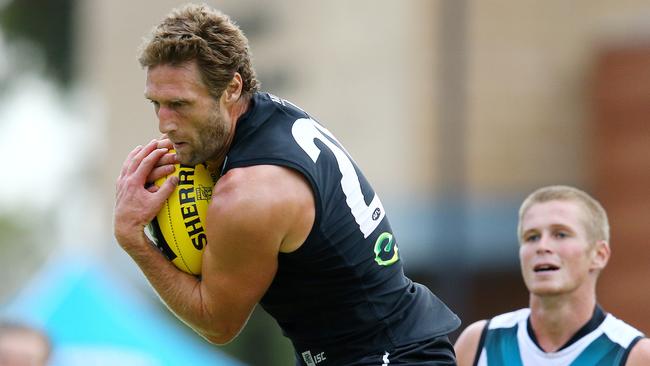
He suffered up to 40 concussions across his playing career.
“It’s been pretty confronting for the family,” Schulz said.
“My kids don’t understand there’s something wrong with Dad’s brain, which has changed the way he is – it’s changed my personality.
“I used to be a very relaxed, calm guy, now I’ve got high anxiety, anger, depression, a very short fuse.”
Griffin said Friday’s lodgement against the AFL was the culmination of a decade’s work in partnership with veteran player agent and concussion campaigner Peter Jess.
“For almost 10 years Peter and I have worked together to assist many former AFL players to come to terms with the issues they face as a result of playing AFL,” Griffin said.
“Today is a watershed day for so many as those that for so long have not had a voice now have a voice and a forum where they will be listened to.”
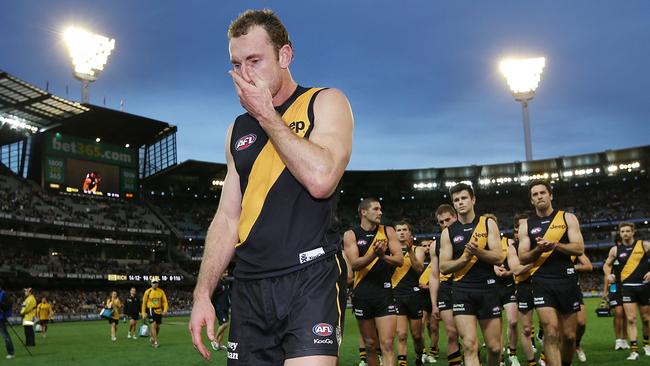
Western Bulldogs premiership star Liam Picken this week launched a separate Supreme Court action against the AFL and his former club alleging negligence and a breach of duty of care over ongoing concussions symptoms, while dual Geelong premiership player Max Rooke was named on Tuesday as the lead plaintiff in another concussion class action against the AFL.
Outgoing AFL chief executive Gillon McLachlan told 3AW on Friday he was “comfortable” with the league’s legal position given a suite of rule changes made over two decades to protect the head.
“We have exercised our duty of care appropriately forever and in the 20 years I have been here,” McLachlan said.
“We have made 30-odd rules changes since 2002 or changes to the review panel to protect the head.”
‘KNOCKED OUT FOR 40 MINUTES’: GILL’S CONCUSSION ADMISSION
– Jon Ralph
AFL chief executive Gillon McLachlan has revealed he suffered multiple seizures and was knocked out for 40 minutes playing amateur football but says he has no regrets about accepting the risk of playing the game.
As the AFL absorbs the fallout of four concussion law suits lodged in recent weeks, McLachlan said an element of playing the game was accepting the personal risk.
The departing AFL chief executive said he was “comfortable” with the AFL’s legal position given a suite of rule changes made over two decades to protect the head.
The AFL is likely to spend as much as $10 million annually from this year on to fund a hardship fund and an improved insurance scheme which could cover each player for up to $2 million in the event of a catastrophic event.
But McLachlan said his own experience was that there was a level of personal risk in contact sport that sometimes meant the likelihood of injury.
He said he had been concussed or knocked out a number of times but “the one thing I do know is that every doctor at every football club takes their responsibility seriously and playing amateurs I felt I was looked after by the medical staff.
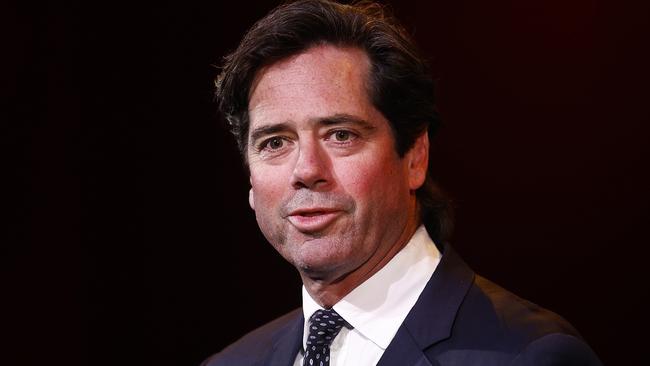
“There was risk out there. I was once knocked out for 40 minutes, had two seizures being knocked out. I am not talking to anyone else’s issues but with what I know, I don’t think about it. There is not one part of my football career or anything I have done with my body that I would change.”
McLachlan played for a decade with the University Blues in the VAFA competition and was on Carlton’s supplementary list from 1996-1997.
He is a life member of the University Blues as well as a keen polo player and national selector.
He told 3AW Radio the league would be “accountable” to any law suits but believed it had been ahead of many rival sports on concussion management.
The Herald Sun revealed this week the league had an aim of being a “global leader” in concussion management in contact-based sports.
“I don’t think about the money or the cost (of law suits). The primary thing you think about is it’s a serious issue and it’s about the health and wellbeing of our athletes, male and female,” McLachlan said.
“I feel comfortable at all times about the decisions (we have made) and I have been around a long time. We have exercised our duty of care appropriately forever and in the 20 years I have been here.
“We have made 30 odd rules changes since 2002 or changes to the review panel to protect the head.
“We think we lead on diagnosis and treatment and we have invested a lot of money on research to be at the cutting edge of decisions that form the first two pieces.
“Then there is also the establishment of a hardship fund for those who fall through the net and need help and within that lens people make an assumption of risk when they play a contact sport like they do when they ride a motorbike or make the decisions they make.
“I feel comfortable with where we are at. If there is an accountability somewhere in the system we will be accountable to it. Our policies and settings have been ahead of most sports around the world.”
JARMAN, BARNES AMONG GREATS IN CONCUSSION CLASS ACTION
Michael Warner
Footy faces a second concussion class action linked to over 100 former AFL players who will claim they have been permanently damaged by the game.
A string of retired players suffering neurological impairment linked to head knocks have been linked to the Griffin case including Hawthorn premiership legend John Platten, Essendon premiership ruckman John Barnes, Mark of the Century high-flyer Shaun Smith and Adelaide Crows great Darren Jarman.
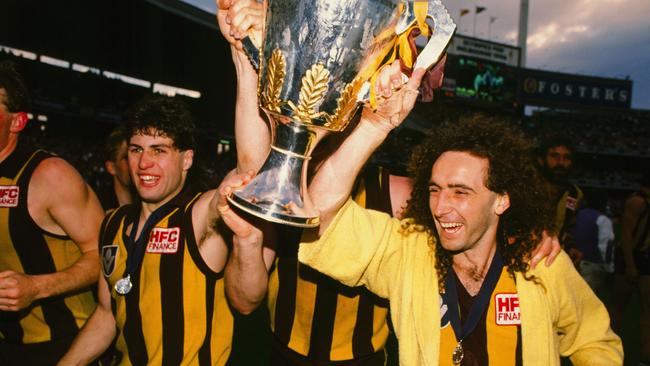
The widow of late Richmond hardman Shane Tuck is also expected to be a plaintiff.
Tuck took his own life in July 2020 and was later found to have been suffering from the crippling brain disease chronic traumatic encephalopathy (CTE).
Western Bulldogs premiership star Liam Picken this week launched a separate Supreme Court action against the AFL and his former club alleging negligence and a breach of duty of care over ongoing concussions symptoms.
Dual Geelong premiership player Max Rooke has been named as the lead plaintiff in another concussion class action against the AFL launched in the Supreme Court on Tuesday.
Long-time player agent and concussion campaigner Peter Jess has been a key driver behind the Griffin case.
“This class action has been a longtime in the making,” Jess said.
“Each plaintiff has undertaken both high-level scans and neurological testing confirming the structural and functional impairment to the brain from playing AFL football.
“The clinical evidence is correlated in video evidence of the concussion events.
“The evidence is compelling.
“Some of the players in the class action have already been independently assessed by the AFL’s medical panel and were found to be suffering career-ending injuries and a payout has already been made for the brain damage clinically confirmed.
“The payouts are capped at $500,000 with no reference to the true economic loss or damage caused to the players, which is manifestly inadequate.
“These issues will be resolved in the litigation.
“A complete review of the AFL and WorkSafe role is required.
“WorkSafe supports the AFL as being a safe workplace in light of 191 individual players suffering brain traumas in the 2021 and 2022 seasons.
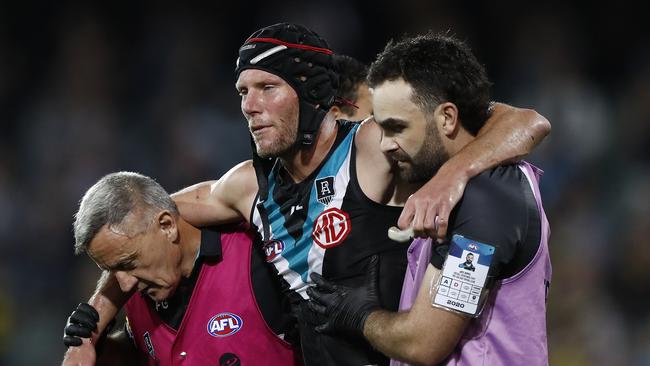
“To suggest that it is a safe workplace is unsupported in medicine and science.
“The AFL and WorkSafe have created intergenerational brain damage to hundreds if not thousands of participants by unsafe return to play protocols, ignoring multiple clinical studies confirming the dangers to the cohort’s neurological health.
“Urgent action is needed to address this ongoing disregard to the health and welfare of its current and past cohort of players.”
An AFL spokesman said: “The health and safety of players at all levels of the game is the AFL’s key priority and the AFL takes concussion and the protection of the brain health of all those playing our game extremely seriously. The AFL has made more than 30 changes to tribunal guidelines and on-field rules over the past two decades to further protect the head and annually updates the concussion guidelines to improve the response to head knocks in our game in accordance with current and evolving science.
“The AFL has a team of people working specifically on brain health initiatives with further appointments to shortly be made and we continue to strengthen protocols and the education of clubs and players as to why this issue is taken so seriously.
“If and when any formal documentation is served regarding a foreshadowed concussion class action, the AFL will review and respond in accordance with the relevant Court’s rules.”
REVEALED: AFL’S CONCUSSION BATTLE HEADS TO SENATE INQUIRY
Jon Ralph
The AFL says it wants to be a “global leader” in managing sports-related concussion as it prepares to clarify its position on the link between head knocks and brain disease CTE at a senate inquiry.
The Herald Sun can reveal the league will spend $25 million on a long-term study to better understand the damage from concussions as it launched a five-year strategic plan into sports-related concussion in the AFL.
The strategic plan will see the AFL this year employing four full-time staff solely on concussion and establishing a multimillion-dollar hardship fund that will see ex-players able to access one-off payouts and ongoing care.
The AFL reaffirmed on Monday that it acknowledged the link between concussions and the degenerative brain disease CTE that was detected in Danny Frawley and Graham “Polly” Farmer after their deaths.
But it is keen to put context around that link when it lodges its submission to the senate inquiry in coming weeks.
The league is open to considering changing rules for junior players to safeguard them from head-knocks in coming years after 30 alterations at senior level to minimise the likelihood of concussion.
AFL clubs have in recent days been sued by premiership star Liam Picken and Collingwood AFLW player Emma Grant but AFL legal counsel Andrew Dillon told the Herald Sun the league was “very comfortable” about its legal position in relation to concussion.
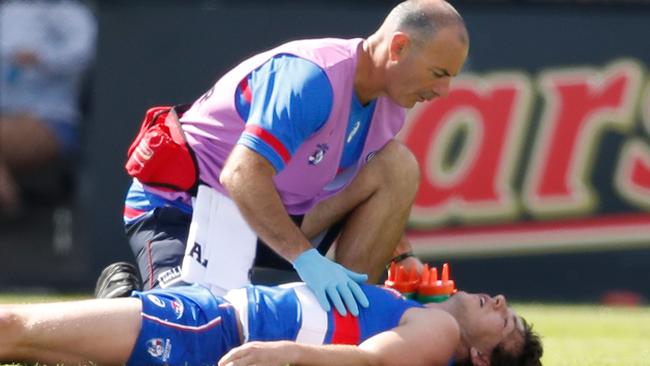
The AFL’s plan running to 2026 includes strategic objectives on concussion management under the pillars educate, prevent, detect, recover, support and innovate.
The league was forced to apologise last year for a poorly-run concussion research for former players through the Florey Institute after an independent investigation into the conduct of former AFL concussion expert Paul McCrory.
As part of the new strategic plan the AFL Brain Health Initiative will be a long-term research project comparing the brains of dozens of AFL and AFLW players to a control group, with those brains eventually donated to research.
The AFL’s head of legal and regulatory Stephen Meade said the league would lodge a submission to an ongoing senate inquiry into concussion stating its position on the links between head knocks and CTE.
But he said it would take more research — including the AFL-funded study costing a minimum of $25 million over the next 10 years — to examine those links.
“We have publicly stated we accept there is an association between concussion and head trauma and CTE,” Meade said.
“We will be saying a bit more in our submission which will be put in shortly. And we understand the desire for there to be an acknowledgment of an express connection to those two things.
“It’s not as straightforward as some people see it. We don’t deny the connection, it is the complexity of the connection that is the piece we will say a bit more about.
“Essentially (the longitudinal study) is trying to measure over time what the impact on Australian footballer’s brain is from their participation in footy and indeed compare it to control subjects so we can see how different it is to a player who is not playing football.
“It’s a bit of an unknown at the moment. There is a lot of talk about the prevalence of CTE but we don’t actually have any insight into what the prevalence of CTE is in the general population and we are going to make a very significant contribution to increasing knowledge around that by undertaking this study.”
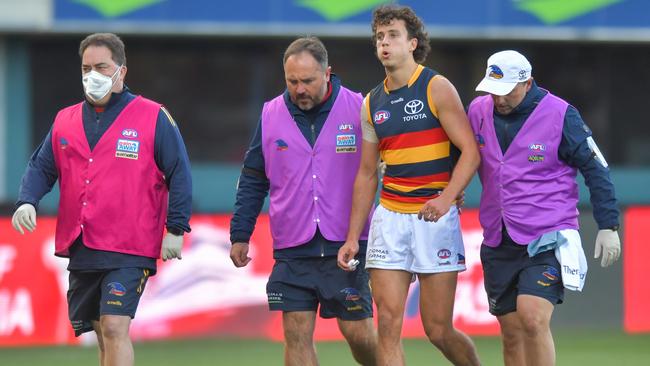
WILL CONCUSSION BRING DOWN FOOTBALL?
Two separate law firms are threatening class actions against the AFL for lives ruined by concussion in a week where two players sued their former clubs, with Liam Picken’s Supreme Court law suit also including the AFL.
But AFL executive Andrew Dillon points to the 30 rule changes made by the AFL to safeguard players in the past two decades as well as stringent return-to-play protocols.
The AFL’s hope is that it can cater for the suffering of retired players battling concussion symptoms with a new hardship fund set to exceed $5 million a season while better insuring players entering the game for potential damage.
The concussion hardship fund being worked on with the AFLPA through Gordon Legal would ideally be announced in concert with a new pay deal to be struck this year.
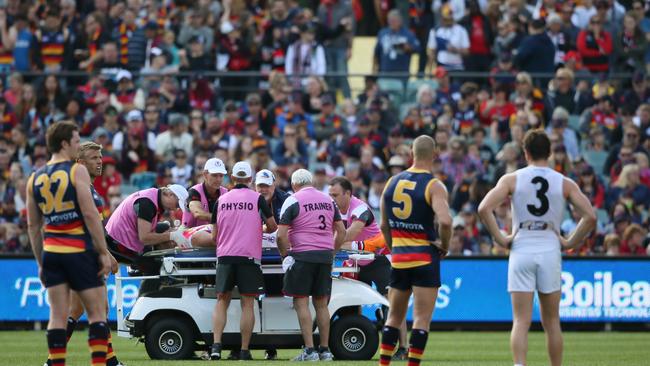
“It is a risk we are managing. We have also got 20-plus years of rule changes and changes to the guidelines so with our duty of care we have been dealing with that,” Dillon said.
“We are very comfortable with our position and what we have done.
“We have people like Michael (Makdissi) who is our chief medical officer who is world renowned. We have a lot of experts working on it. We have got world-class doctors at all our clubs who are charged with looking after our players.
“That said, we do note there are some players who have played our game and they are injured and they are hurting and it’s why we are looking at this proposed financial assistance scheme to help players who make the game what it is. If we are in a position where we can do both, that is what we want to do. It is a risk that we are going to continue to manage and we take it very seriously.”
More Coverage
Originally published as Jay Schulz one of three lead plaintiffs in concussion class action lodged against the AFL





